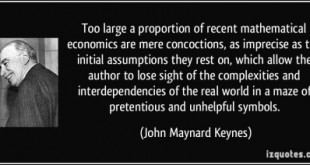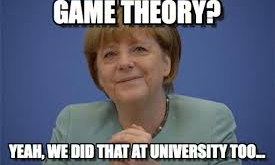Bernie Sanders and the Verdoorn law Reading the different reactions, critiques and ‘analyses’ of Gerald Friedman’s calculations on the long term effects of implementing the Sanders’ program, it seem to me that what it basically burns down to is if the Verdoorn law is operative or not. Estimating the impact of Sanders’ program Friedman writes (p. 13): Higher demand for labor is also associated with an increase in labor productivity and this accounts for about half of the increase in...
Read More »Making sense of data — categorical models
Making sense of data — categorical models [embedded content] Great lecture by one of my favourite lecturers — Scott Page.
Read More »Macroeconomic machine dreams
Many mainstream macroeconomists hold on to the hope that they will not be doomed forever to always ‘fight the last war,’ but instead, building on timeless microfoundational rules — Lucas ‘deep parameters’ — they will be able to predict upcoming problems before they happen. Adding some new little twist to the DSGE model will make all the difference … What these economists ‘forget,’ however, is that to produce these n:th variations of the basic DSGE model, they still have to make...
Read More »Macroeconomics on a walk down a blind alley
Macroeconomics on a walk down a blind alley I would say that people like Kydland and Prescott, and so forth, people like that … changed the way that people do macroeconomics. But in my view it was not a positive change … One predominant idea is that of external shocks—and in particular the idea that the shocks that happen to the economy should essentially be the technological shocks. As Joe Stiglitz said, what could we mean by a negative technological shock? That people forget what they...
Read More »Economists — dangerous arrogants
Economists — dangerous arrogants In advanced economics the question would be: ‘What besides mathematics should be in an economics lecture?’ In physics the familiar spirit is Archimedes the experimenter. But in economics, as in mathematics itself, it is theorem-proving Euclid who paces the halls … Economics … has become a mathematical game. The science has been drained out of economics, replaced by a Nintendo game of assumption-making … Most thoughtful economists think that the games on the...
Read More »‘Mathematical’ economists and real mathematicians
‘Mathematical’ economists and real mathematicians Years ago, I was involved in organising conferences with Christopher Zeeman … and we organized one between economists and mathematicians. We had some great mathematicians—John Milnor, Steve Smale, Rene Thom, and others—wonderful mathematicians. And on the other side, we had Gérard Debreu, Hugo Sonnenschein, Werner Hildenbrand, and a whole group of very distinguished mathematical economists. After the first two, three hours, I think it was...
Read More »The limits of game theory
The limits of game theory If you read Binmore’s Essays on the foundations of game theory (1990) you will find a section where he says that, unfortunately, we get into a kind of impasse. We get this infinite regress linked to the common knowledge problem. For example, I drive frequently from Aix to Marseille. You have the autoroute and parallel to it is the routenationale. Say there is, one day, congestion on the autoroute and nobody on the nationale. I think: “Tomorrow I will take the...
Read More »How could ‘testing axioms’ be controversial?
How could ‘testing axioms’ be controversial? Of course the more immediate target of Davidson in his formulation of the argument in the early 1980s was not Samuelson, but Lucas and Sargent and their rational expectations hypothesis … This was indeed the period when new classical economics was riding at its highest point of prestige, with Lucas and Sargent and their rational expectations assumption apparently sweeping the boards of any sort of Keynesian theories.Curiously, they did not seem...
Read More »On the non-existence of economic laws
On the non-existence of economic laws In methodischer Hinsicht verdankt das ökonomische Erkenntnisprogramm ohne Zweifel dem Einfluss der klassischen Physik eine wichtige Komponente, nämlich den Gedanken, dass die sozialen Phänomene ebenso von Gesetzmässigkeiten beherrscht sind wie die Naturerscheinungen und dass es daher angezeigt ist, solche Gesetzmässigkeiten zu suchen und theoretisch in ähnlicher weise zu kodifizieren, wie Newton das für die Gesetze der Mechanik in seinem System...
Read More »Arrow on microfoundational reductionism
The economy is irreducible … in the sense that no matter how the households are divided into two groups, an increase in the initial assets held by the members of one group can be used to make feasible an allocation which will make no one worse off and at least one individual in the second group better off. It is perhaps interesting to observe that “atomistic” assumptions concerning individual households and firms are not sufficient to establish the existence of equilibrium; “global”...
Read More » Heterodox
Heterodox









